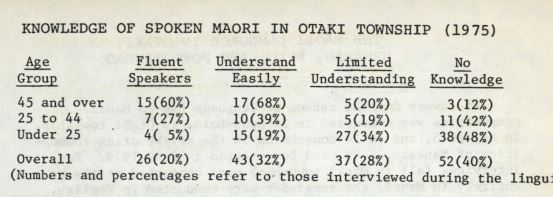-
Ngā Karere me Ngā Rauemi
News and Resources
Ngā Karere me Ngā Rauemi
News and Resources
-
Te Rangaihi Reo Māori
The Movement
Te Rangaihi Reo Māori
The Movement
-
Te Pae Kōrero
Our Community
Te Pae Kōrero
Our Community
-
Huihuinga
Events
Huihuinga
Events
-
Ngā Ara Ako
Learning Pathways
Ngā Ara Ako
Learning Pathways
-
SearchSearch
Search
Search

Quite a number of families, both in the town and in the country districts, told our interviewers that they regretted the loss of the language, and were trying to do something about this by encouraging their children to take an interest in Maori; some parents were themselves studying Māori at night classes. There seemed to be a strong general support for moves to promote the use of the Maori language in the schools and in the community generally (one informant in the 1978 survey specifically mentioned bilingual education in this regard). A few families thought that such moves were too late -- the Maori people were now living in a Pākehā world, and the Maori language belonged to a dead past. This was certainly a minority view, and a much larger number of
parents said they would like to know much more about the Maori language themselves.
Te Whanganui-a-Tara | Wellington | Kapiti Coast | 1970-79 | 5% of Māori children can speak te reo. (1970-75) | Story is by tangata whenua
















Comments